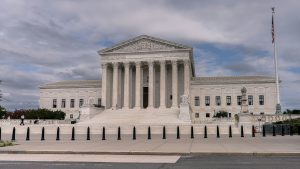Published on


The University of Missouri School of Law Veterans Clinic has filed an amicus brief in the Supreme Court of the United States in the case of Feliciano v. Department of Transportation. This landmark case addresses the entitlement of federal employee reservists to differential pay during active-duty service in a national emergency.
The case centers on Nick Feliciano, a Coast Guard reservist employed by the Federal Aviation Administration as an air traffic controller. Feliciano was called to active duty for several periods from 2012 to 2017, during which time the United States was under a declared national emergency following the 9/11 terrorist attacks. He seeks differential pay for his periods of service, asserting that the law entitles him to the difference between his federal salary and his reserve pay.
The legal question before the Supreme Court is whether reservists like Feliciano are entitled to differential pay simply by serving “during” a national emergency, or whether they must demonstrate a connection between their service and the national emergency itself. The Federal Circuit previously ruled that the latter standard applies, requiring proof of a causal relationship between the reservist’s service and the national emergency—a decision the Clinic argues is both legally flawed and harmful to reservists and their families.
In its brief, the Clinic highlighted the critical role of modern reservists, who are frequently called upon to serve the nation, particularly as the U.S. military faces recruitment challenges. The brief emphasizes the detrimental impact of the Federal Circuit’s higher standard on reservists and their families, potentially leaving them in financial uncertainty and without critical support during and after their service.
“We believe the Federal Circuit’s interpretation misrepresents the nature of reservist service in the post-9/11 era and imposes an unnecessary burden on those who serve our country in dual capacities,” said Brent Filbert, the Director of the Mizzou Law Veterans Clinic. “This case is about ensuring that our reservists receive the financial stability and support they deserve, without having to jump through excessive legal hurdles.”
The outcome of this case could affect thousands of reservists and their families who rely on differential pay during active duty. The Clinic stands in support of Feliciano and all reservists whose service to their country should be honored with the financial protections they are owed.
In addition to its longstanding focus on veterans, the Mizzou Law Veterans Clinic is expanding its work to address legal issues affecting active-duty service members. This amicus brief marks a significant step in the Clinic’s efforts to advocate for the rights and financial security of those currently serving in the military. This brief joins numerous others in the Clinic’s robust amicus briefing initiative.
The University of Missouri School of Law Veterans Clinic represents veterans and their family members – free of charge – with their Department of Veterans Affairs disability benefits claims and Department of Defense discharge upgrades. Since its inception in 2014, the Clinic has secured more than $16 million in federal disability compensation benefits and numerous discharge upgrades for its clients.